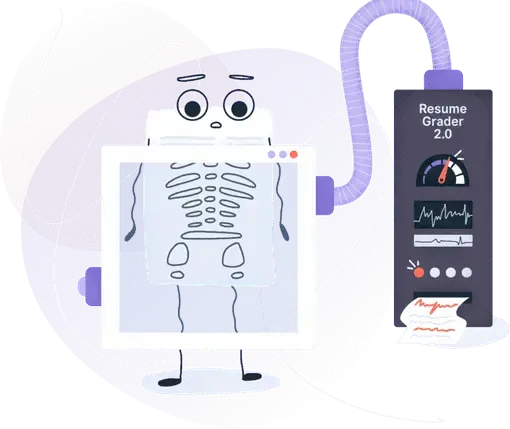Statistics Skills: Example Usage on Resumes, Skill Set & Top Keywords in 2025
Displaying statistical acumen on a resume signals to recruiters your ability to analyze data and extract meaningful insights, showcasing your analytical prowess. Dive into the guide below for inventive ways to polish your resume and discover fresh terminology to highlight your skills.


Is your resume ATS-friendly?
Drop your resume here or upload a file to find out if the skills in your resume are readable by an ATS.
Statistics is a skill that involves collecting, analyzing, interpreting, and presenting data. Having a good grasp on statistics means that you can take large sets of numbers, see the patterns and trends, and explain them in a way that makes sense to others. This skill is incredibly valuable in many industries, from business and healthcare to government and education. When you include statistics on your resume, it shows prospective employers that you're capable of making informed decisions based on real data, which is a key part of solving problems and planning strategies.
However, listing statistics as a skill on your resume comes with a few potential drawbacks. If your experience with statistics isn't strong, it might make you seem less credible if you fail to back it up with specific examples or related accomplishments. Also, simply stating you have "statistics skills" without context can be too vague. Instead, it's beneficial to show how you've used statistics to achieve concrete results or influence decisions in past roles. It demonstrates practical application and indicates that you've provided value to previous employers with your analytical abilities.
In this article, you will learn:
- Specific examples of statistics in action to make your resume stand out.
- The potential pitfalls of overselling your statistics abilities and how to avoid them.
- Alternate phrases and synonyms for "statistics skills" to add variety to your resume.
Misusage of statistics on resumes
Employers value the ability to interpret and present data accurately, and highlighting your statistical skills can significantly strengthen your resume. However, exaggerating your proficiency or misrepresenting your experience with statistics can be a critical error. Credibility is paramount in a professional setting, and any indication that you've inflated your abilities will raise doubts about your integrity and attention to detail. A resume should accurately reflect your abilities and give potential employers a reliable snapshot of what you bring to the table.
- In the summary section: Claiming to have "Extensive experience in high-level statistical analysis" when your experience is limited to basic data entry and simple chart creation.
- In the experience section: Listing "Led complex data modeling for multi-year project" when your role was only to input data into pre-existing templates.
- In the achievements section: Stating "Increased company revenue by 50% through statistical forecasting" without clarifying that your analysis was a small part of a larger team effort.
How to demonstrate statistics skills on your resume
- List your academic credentials related to statistics, including any degrees or certifications, to showcase your foundational knowledge.
- Highlight specific statistical software proficiency, such as SPSS, R, or Python libraries, to demonstrate practical skills.
- Describe relevant projects or work experience using statistics, including the methods and data analysis techniques applied, to show real-world application.
- Include any published work or presentations in statistics to exhibit your ability to communicate complex quantitative findings clearly.
- Mention any additional training or workshops attended that focus on new statistical methods or best practices to indicate your commitment to staying updated in the field.
Example 1: Demonstrate statistics in the experience section
- •Analyzed user engagement data across 50+ campaigns, resulting in a 30% increase in user retention.
- •Streamlined data collection processes, which cut down report generation time by 40%.
- •Managed a team of 4 junior analysts on a project that forecasted market trends, influencing a 15% budget reallocation to emerging technologies.
- •Led a renewable energy project that achieved a 200% efficiency improvement over two years.
- •Oversaw annual budgets exceeding $1 million, consistently coming in under budget by at least 10% each fiscal year.
- •Implemented new agile project management techniques, shortening delivery times by 25%.
- •Consistently surpassed sales targets by at least 20% each quarter, contributing to a record profit year in 2016.
- •Cultivated customer relationships that increased the store's repeat business by 35%.
- •Trained over 30 new employees in effective sales strategies and customer service, empowering them to be productive team members quickly.
- A resume should highlight quantifiable achievements, like the sales target overachievement and efficiency improvements in projects.
- Showcasing specific metrics gives a clear picture of your impact like reducing report generation time or cutting budgets.
- Demonstrating leadership through managing teams and training new employees reveals your capability to take charge and mentor.
- Including the outcomes of your work, like increased retention or faster delivery times, connects your actions to business goals.
- A well-rounded experience section covers a range of responsibilities and skills, from data analysis to project management and sales.
Example 2: Demonstrate statistics in the summary section
- A clear demonstration of experience and proficiency in the relevant field with quantifiable achievements shows the applicant’s suitability and potential impact.
- Directly stating the amount of industry experience provides a solid context for the applicant's expertise.
- Highlighting major career highlights and contributions without using overused terms ensures authenticity and can engage potential employers.
- Specifying technical skills, like Advanced Excel abilities, informs a prospective employer about the candidate's specific competencies relevant to the job's core functions.
- Expressing a genuine interest in achieving results and improving processes signals an alignment with performance-driven roles.
- Writing in an accessible and straightforward manner makes the summary easy to understand and appealing to a broad audience.
- By avoiding cliches and buzzwords, the summary maintains its objective tone and stays focused on substantiated facts.
Example 3: Demonstrate statistics in the achievements section
- Uses concrete numbers to show results.
- Describes specific actions taken to achieve results.
- Focuses on real work situations.
- Avoids general buzzwords or vague terms.
- Titles are concise and to the point.
- Descriptions provide a clear, concise picture of the accomplishments.
- Describes team leadership and impact on a group scale.
- Highlights technical skills with practical applications.
What are the relevant certifications for statistics skills on resume
These certifications can elevate your statistical analysis skills and improve your career prospects:
The top 5 certifications for gaining statistics skills expertise:
This certification confirms your proficiency in applying statistical techniques for business process improvements, focusing on data management and predictive modeling.
The ASA's certificate program is aimed at enriching your theoretical foundation and practical application of statistical methods in various fields.
Harvard's program strengthens your data science skills, combining statistics with computer science and data analysis to prepare you for a multitude of data-driven roles.
This credential demonstrates your expertise in the end-to-end analytics process, from framing business and analytics problems to model building, deployment, and lifecycle management.
Penn State's certificate program helps you develop advanced statistical analysis skills to interpret data effectively in a broad range of contexts.
Top skills people add together with statistics skill on resume:
JavaScript
HTML
CSS
Python
SQL
Data Analysis
Project Management
Adobe Photoshop
Social Media Marketing
Machine Learning
Communication
Problem-solving
Adaptability
Leadership
Teamwork
Creativity
Work Ethic
Interpersonal Skills
Time Management
Attention to Detail
Critical Thinking
Most relevant jobs for statistics skills
Statistics skills are highly valued across various industries for their ability to help make informed decisions, forecast trends, and understand complex data. Professionals with statistical expertise are sought after for roles that range from analyzing consumer behavior to shaping public policy.
- Data Analyst - Interprets data to help companies make better business decisions.
- Statistician - Collects, analyzes, and presents numerical data for research and policy assessment.
- Market Research Analyst - Studies market conditions to assess potential sales of a product or service.
- Actuary - Analyzes financial risks using mathematics, statistics, and financial theory.
- Biostatistician - Applies statistical methods to biological and health-related research.
- Operations Research Analyst - Uses statistical techniques to address logistical and operational challenges.
- Quantitative Analyst - Applies mathematical and statistical methods to financial and risk management problems.
- Economist - Studies economic data and trends to provide strategic advice to businesses and government entities.
- Machine Learning Engineer - Develops algorithms that allow computers to learn from and interpret data.
- Quality Assurance Analyst - Ensures the integrity of data and adherence to quality standards in processes and products.
Key takeaways
- Statistics skills boost your resume by showcasing your ability to analyze data and make informed decisions.
- Avoid misusing statistics by double-checking your sources and the methods you use to interpret data.
- Showcase your statistics skills on your resume by providing concrete examples of when you've successfully applied these skills.
Make one that's truly you.




